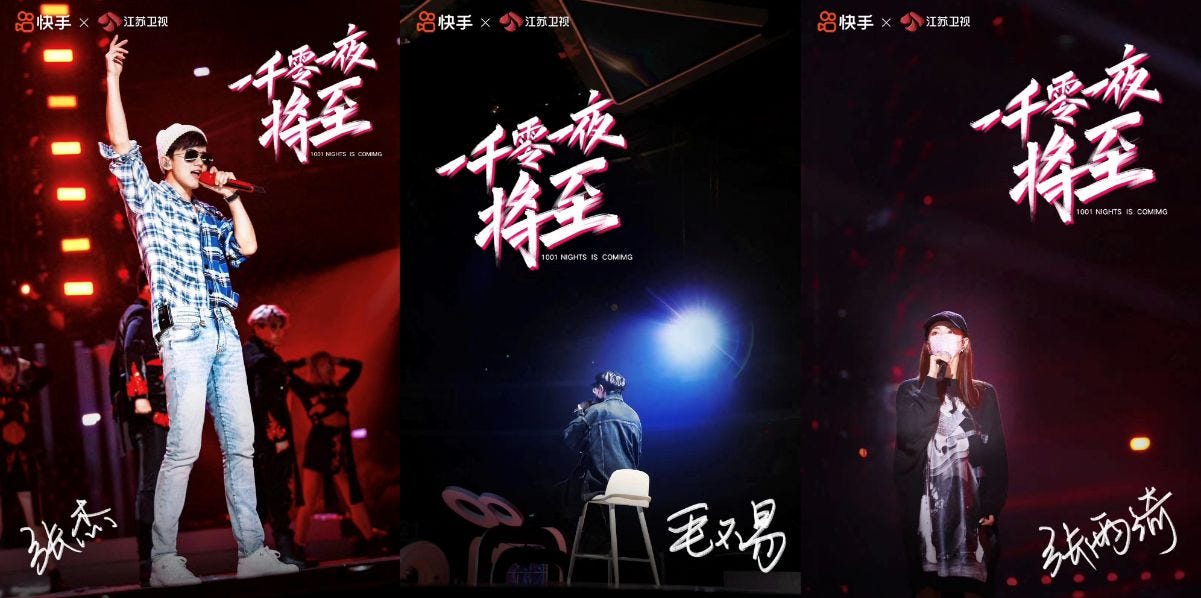Booming in Asia, Shoppable Streaming Video Faces a Bumpy Road in the U.S.
Plus: Perfect Diary looks west, the female-focused reality trend, and a content-commerce battle for Singles' Day.
The Content Commerce Insider newsletter highlights how brands create content to drive revenue. If you have received our newsletter from a friend or colleague, we hope you will subscribe as well and follow us on LinkedIn and Instagram.
As the intersection between streaming entertainment and e-commerce continues to blur in markets like China — where companies such as Tencent actively cultivate talent, create strongly branded programming, and promote both via an expansive range of owned social platforms — shoppable streaming video is only now taking its awkward early steps in North America.
The recent debut of “Get Organized with the Home Edit” on Netflix is one example of a program that aims to integrate its primary sponsor, The Container Store, yet struggles to close the commerce loop. Modern Retail noted the show’s placement of products from The Container Store and its not-so-subtle branding: “stars Clea Shearer and Joanna Teplin, who own an organizing business in Nashville [...] find ways to box up messes. Almost all of the organizing products they selected came from The Container Store.”
After the show’s debut, The Container Store reported a nearly 17% increase in sales, which the company attributed to a “relative halo effect” from “Get Organized,” though that remains unprovable due to the lack of a clear path to purchase via Netflix.
However, the creation of avenues to in-browser purchasing may be coming relatively soon, and most likely via Amazon, which is perhaps the closest thing the U.S. has to a media/tech/e-commerce powerhouse on the level of Tencent (owner of “super-app” WeChat, streamer Tencent Video, Tencent Music Entertainment, Tencent Games, studio Tencent Pictures, and a major investor in other content and commerce platforms such as Kuaishou, Bilibili, and JD.com).
Earlier this year, Amazon tested the waters of shoppable video with its fashion reality show “Making The Cut,” starring Tim Gunn and Heidi Klum. Designed as a promotional vehicle for its fledgling luxury fashion e-commerce business, the show inserted an e-commerce angle by allowing viewers to purchase the winning outfits from each episode via an embedded Amazon link.
While the market of shoppable video technology is growing and the likes of Netflix and Amazon Prime Video are experimenting more with content-commerce, it is clear that the U.S. market lags far behind China in both the means to integrate this type of content-commerce and consumer adoption of in-video shopping, along with livestreaming e-commerce.
There are a couple of key reasons for this. First, with the obvious exception of Amazon, there are few Western counterparts to the Chinese tech giants that actively create, distribute, and promote all types of entertainment content. In China, companies such as Alibaba, Tencent, and Bytedance are already able to crunch vast amounts of user data to formulate programs that can then attract specific sponsors aimed at specific demographics, then produce that programming and include the paths to purchase that keep the consumer within their particular network of platforms (often within the same mobile app).
This kind of expansive reach and influence is currently unthinkable elsewhere, although Amazon, Google, Facebook, and Apple are all currently capable of integrating e-commerce into one or more of their owned platforms in one way or another.
Second, it will take time for American consumers to accept the integration of e-commerce in streaming video as trustworthy and, in the case of livestreaming e-commerce, shake off associations with television home shopping networks of the 1980s and 1990s. In China, which largely leapfrogged this type of sales-focused television programming and went straight to mobile entertainment, there were no such obstacles, and consumers have been captivated by the novelty of hours-long livestreamed sessions in which influencers hawk everything from kitchen supplies to luxury handbags.
Both for technology in and consumers in the United States simply need to catch up. However, facing a protracted Covid-19 struggle, it might be the right time for the likes of Amazon to push more aggressively towards keeping homebound viewers glued to their devices and integrating more shoppability into their content sooner rather than later.
- by Avery Booker
Mentioned in today’s newsletter: Amazon, Ant Group, Bilibili, Burberry, Crest, Estée Lauder, H&M, Instagram, JD.com, Kuaishou, L’Oréal, Mango TV, Netflix, Nike, Olay, Perfect Diary, Shein, Tencent, Thanmelin, TikTok, Vipshop, Youtube, Zara.
Mango TV Draws Beauty Brands for Its Female Audience
by Ginger Ooi
The success of the summer’s “30 over 30” reality competition “Sisters Who Make Waves” (乘风破浪的姐姐) on Mango TV brought C-beauty brand Thanmelin huge publicity as its title sponsor. Now, the streaming subsidiary of Hunan Television is emerging as the video platform of choice for cosmetics and skin care labels that seek to reach a valuable consumer demographic. Mango TV boasts a viewership that is more than 75% female, and young, with nearly 62% if its audience under the age of 24, while also skewing urban and upwardly mobile.
Along with the recent premiere of “Lady Land” (姐姐的爱乐之程), a follow-up to “Sisters Who Make Waves,” Mango TV released two more female-focused reality shows in October: namely “What About Her Emotions?” (她有情绪又怎样) and the third season of “Meeting Mr. Right” (女儿们的恋爱3).
“What About Her Emotions?” is China’s first women’s “emotional healing” program, and stars actress Qi Wei along with top livestreamer Li Jiaqi among the regular hosts. The series explores the dilemmas faced by women over the age of 30 in contemporary modern society and offers opportunities to overcome psychological barriers, aiming to provide a safe space for people to share their problems and receive advice from the celebrity hosts that can help them come out stronger. Skin care brand Helius is the title sponsor of the program, using the slogan, “Focus more on your emotions to let your skin radiate.”
Meanwhile, Mango TV’s talk show “Meeting Mr. Right” (女儿们的恋爱3), focuses on the relationships between fathers and daughters (alongside their daughters’ boyfriends). The series has partnered with global skincare brand Olay and toothpaste brand Crest as joint title sponsors, with e-commerce platform Vipshop also supporting the series.
All three shows fit into the new trend of female-focused reality shows (她综艺) offering new opportunities for brands to appeal to varied female audience groups.
Can TikTok and Troye Sivan Be Perfect Diary’s DTC Conduit to the Global Gen Z Market?
by Avery Booker
To date, fast-growing C-beauty brand Perfect Diary has yet to make aggressive moves into Western markets. But this could be set to change with the brand’s announcement of Australian actor and singer Troye Sivan as the new face of its animal eye shadow collection, news of which came just days after it named actress Zhou Xun as its first global brand ambassador.
Sivan is hugely popular with Gen Z audiences, boasting a massive online following that includes more than 11 million Instagram followers, 7.3 million Youtube subscribers, and 935,000 TikTok fans.
The choice of Sivan, whose young fanbase mirrors in some ways the following of “lipstick king” Li Jiaqi, is an interesting one for Perfect Diary as it hints that the brand may see Western social media platforms in general (and TikTok in particular) as a conduit to westward expansion — making it an “internet famous” (wanghong) brand both in its home country and abroad, without the need for a bricks-and-mortar expansion effort.
This strategy would mirror one adopted by the Chinese fast-fashion brand Shein, which has seen great success selling to Western teen consumers via TikTok marketing in particular. With more than 943,000 TikTok followers and nearly 8 million likes, Shein has quickly risen as a potential competitor to Zara and H&M without any physical stores is now the world’s largest online-only fashion company, according to Euromonitor.
Read the full article on Content Commerce Insider
Museums and Mobile Gaming: The Next Digital Frontier
Thanks to the smartphone revolution, mobile gaming is literally at our fingertips. That near-constant availability has contributed to a global upsurge of casual gamers. According to a May 2020 report by Niko Partners, revenue for mobile and PC games in China reached $33.1 billion in 2019, and is set to surpass $46.7 billion by 2024. But it’s not the only one.
As cultural institutions confront the ramifications of the global pandemic, mobile games offer an opportunity for innovative digitization with 24/7 promotion and communication. As with in-person museum visits, Chinese see gaming as social interaction, said Daniel Ahmad, senior analyst for Niko Partners. “It is considered the best social activity at the lowest price point. Chinese gamers love to play at home on WiFi, but also on public transportation, at a restaurant, or out sightseeing and shopping,” he told Jing Culture & Commerce.
Mobile games lend immediacy to museums and galleries, as well as the opportunity to host an unlimited audience. In turn, museums’ prestige increases the cultural capital of gaming apps. Here are three ways in which museums and gaming can collaborate.
Read the full story on Jing Culture & Commerce
Brand Film Pick: Ant Group Releases Short Film Collection to Mark IPO
The Alibaba-affiliated fintech giant Ant Group recently made history as the world’s biggest IPO with a dual listing in Hong Kong and Shanghai that raised more than $34 billion. As part of its roadshow ahead of the offering, Ant Group produced a series of four short films that aim to highlight the human connections enabled by the tech firm.
The four episodes that make up the series were inspired by real-life stories from users of Alipay, Ant Group’s market-leading mobile payments app, and explore the relationship between individuals and technology with the recurring theme of “user first.” From a stuttering young man who plays an immobile terracotta warrior for tourists (and bears a resemblance to Alibaba founder Jack Ma) to a blind masseuse, the films’ emphasis on accessibility and the human touch offers a creative take on the cold concepts behind modern fintech.
News From China
The battle for content-commerce supremacy for Singles’ Day continues to escalate. Over the past weekend, Tmall, Kuaishou, and Suning all aired celebrity-filled gala programs on major satellite networks, vying for audiences and sales boosts.
Best known for short video, Kuaishou has made big moves into livestreaming and e-commerce over the past year, with more than 100 million daily active users shopping on the platform. Now in its third year of participation in Singles’ Day, Kuaishou hosted a splashy “1,001 Nights” (一千零一夜) special on Jiangsu Satellite TV on October 30, which gave rise to more than 40 hot searches on Weibo, and brought together dozens of stars, including Chinese pop king Jay Chou, and more than 100 popular Kuaishou creators to perform.
In addition to hosting big TV galas, rivals Tmall and JD.com are relying on the trending stand-up comedy show format to keep shoppers engaged over the coming weeks. JD.com recently aired a “season 3.5” of Tencent Video’s popular competition “Rock n Roast” (脱口秀大会) as a livestreamed promotional event and later featured some of its stars to promote its “Super Flash Sales Day” on November 1, while Tmall is enlisting a dozen comedians to engage in e-commerce livestreaming for hot products over eight consecutive nights, and Alibaba’s paid customer-loyalty program, Ali 88VIP, is planning a variety show-style event with song and dance performances as well, including acts such as rappers Gai and Nineone.
Tmall kicked off a new three-day presales promotion period on November 1, which saw more than 100 brands hit RMB 100 million ($15 million) in sales within the first 111 minutes. Consumer electronics, home appliances, and beauty were the top-selling categories, with L'Oréal, Estée Lauder, Lancôme, and Perfect Diary among them. Nike was the first sportswear brand to join the RMB 100 million club.
The 2020 League of Legends World Championship concluded in Shanghai on October, 31, the first major global esports tournament to take place in the Covid-19 era, and South Korea’s Damwon Gaming ended a two-year winning streak from Chinese teams when it defeated Suning Gaming to take the title.
Video streamer Bilibili became the exclusive China broadcaster for the championships this year, its third year livestreaming the event, and reports that it saw a 300% increase in viewers compared to 2019.
Beyond the live coverage, Bilibili developed an extensive content ecosystem tied to the LoL world championships that encompassed user-generated videos, documentary production, and offline activities. Bilibili’s community of creators, known as Uploaders, produced more than 150,000 videos related to the tournament, spanning the range of lifestyle interests popular among Bilibili’s largely Gen Z audience, from technology to art to beauty to music.
Bilibili also launched an interactive secondary livestreaming channel for the championships with special guests including professional commentators, Uploaders, and actors and contestants from Bilibili’s original series such as the recent hit “Rap for Youth” (说唱新世代).
More than 100 brands participated in this year’s Lol World Championships, whether by sponsoring teams, such as sportswear brands Nike and Li Ning, or through official partnerships such as Oppo’s and Mastercard’s that extend into product collaborations and content creation.
Luxury and fashion brands have also been keen to get into China’s esports scene, and the latest to do so is Burberry, which announced a partnership with Tencent’s “Honor of Kings” that will see elements of Burberry design introduced into the game’s environment. Though specifics of what the deal will entail were sparse, Tencent Games VP Mars Hou said they will aim to “surprise everyone with something really different” that will be released next year.
News in English
In what would be a major fashion play, Alibaba is reportedly seeking to invest $300 million in the U.K.-based luxury e-commerce platform Farfetch, which could boost its already active presence in the Chinese market. Reuters
Alibaba and two other Chinese e-commerce firms — JD.com and Pinduoduo — now account for 44% of global online sales. Forbes
Western brands without an existing presence in China are starting to pay more attention to Singles’ Day opportunities to connect with cross-border shoppers and expats in innovative ways. Vogue Business
Too much focus on gross merchandise volume and relying entirely on Alibaba’s Tmall are among six missteps brands would be wary of when planning Singles’ Day campaigns. Hotpot China
Big numbers: Livestreaming via Alibaba’s Taobao Live platform brought in $7.5 billion in sales during the first 30 minutes of Singles Day presales last week. SCMP
China’s “influencer fatigue” has been compounded by Covid-19, with more brands turning to consumers and developing their own talent to boost sales instead of spending on big names. Parklu
The China opportunity may have been what ultimately saved the LVMH-Tiffany deal from falling apart. Nikkei Asia
C-beauty unicorn Perfect Diary’s parent company Yatsen filed for an IPO in New York to raise up to $100 million, the same day it announced its acquisition of the French skincare brand Galenic from Pierre Fabre. WWD
Also imminent on the IPO watch is Kuaishou, which is reportedly getting closer to listing in Hong Kong at a valuation of $50 billion. KrAsia
From coffee to gaming, why brand collaborations are such a big deal in China. CGTN
Another reprieve for TikTok in the United States as a federal district judge blocked a Commerce Department order that would have barred the app from operating as of November 12. Reuters
How e-commerce livestreaming has become a lifeline for a small garment manufacturing town in eastern China. Xinhua
We’ve Got China Covered
China Film Insider: Chinese Sci-Fi Industry Report 2020 Made Public at Sci-Fi Conference
Jing Daily: Through See LV, Louis Vuitton Wants the World to See Wuhan
Jing Culture & Commerce: Inside British Museum and Alibaba’s Livestream Partnership









